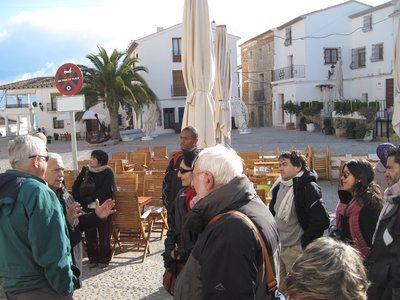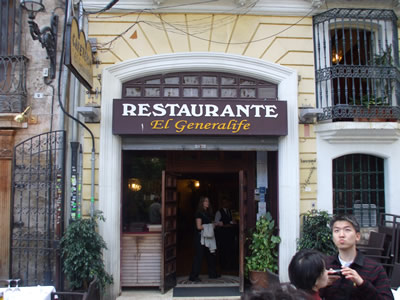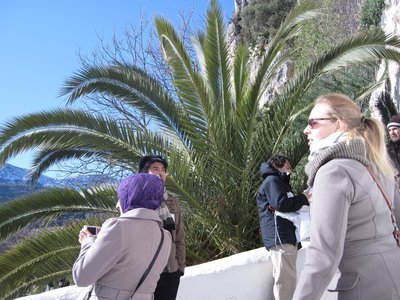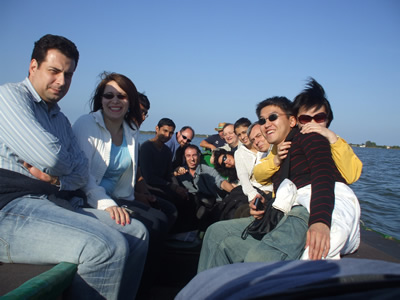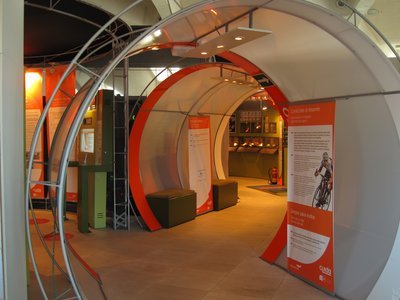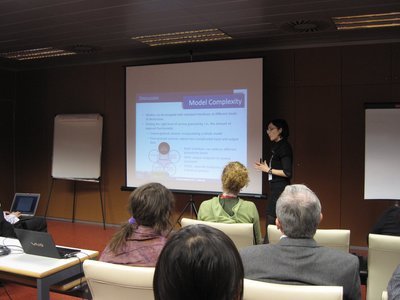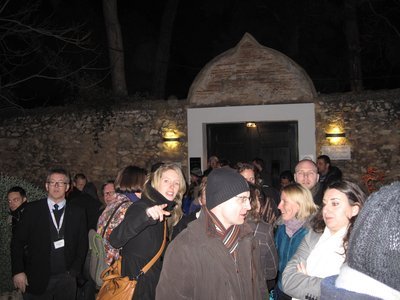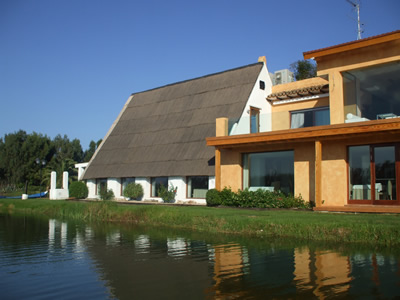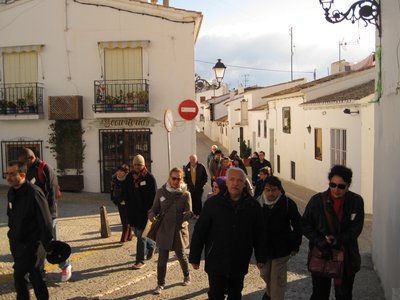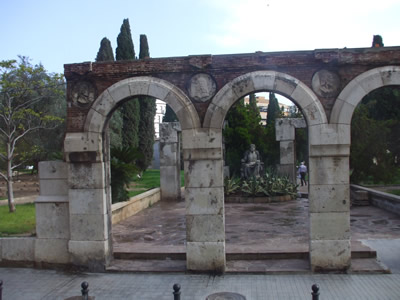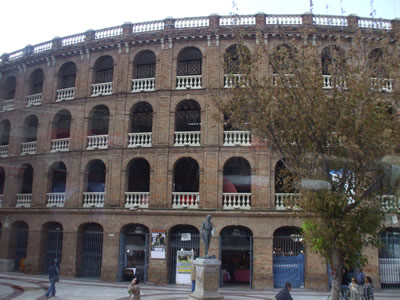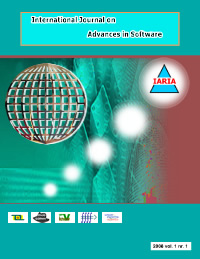CLOUD COMPUTING 2025 - The Sixteenth International Conference on Cloud Computing, GRIDs, and Virtualization
April 06, 2025 - April 10, 2025
CLOUD COMPUTING 2025: Call for Papers
Onsite and Online Options: In order to accommodate various situations, we are offering the option for either physical presence or virtual participation (pdf slides or pre-recorded videos).
Cloud computing is a normal evolution of distributed computing combined with Service-oriented architecture, leveraging most of the GRID features and Virtualization merits. The technology foundations for cloud computing led to a new approach of reusing what was achieved in GRID computing with support from virtualization.
CLOUD COMPUTING 2025 is intended as an event to prospect the applications supported by the new paradigm and validate the techniques and the mechanisms. A complementary target is to identify the open issues and the challenges to fix them, especially on security, privacy, and inter- and intra-clouds protocols.
We solicit both academic, research, and industrial contributions. We welcome technical papers presenting research and practical results, position papers addressing the pros and cons of specific proposals, such as those being discussed in the standard fora or in industry consortia, survey papers addressing the key problems and solutions on any of the above topics short papers on work in progress, and panel proposals.
Industrial presentations are not subject to the format and content constraints of regular submissions. We expect short and long presentations that express industrial position and status.
Tutorials on specific related topics and panels on challenging areas are encouraged.
The topics suggested by the conference can be discussed in term of concepts, state of the art, research, standards, implementations, running experiments, applications, and industrial case studies. Authors are invited to submit complete unpublished papers, which are not under review in any other conference or journal in the following, but not limited to, topic areas.
All topics and submission formats are open to both research and industry contributions.
CLOUD COMPUTING 2025 conference tracks:
TRENDS: New trends
Fog-computing; Mobile Edge Computing; Cloudlets; Hosted Cloud services (WebRTC, Containers, Cloud micro-services); Cloud computing and SDN/NFV; Cloud computing and 5G; Cloud computing and LTE Pro 4.5; Cloud computing ad Big Data; High performance computing (HPC) in the Cloud; Superfluid Clouds; Mobile Apps to the public Clouds; Vehicular Cloud networks; Cloud orchestration features; Converged edge systems; Cloud federation; Micro-cloud provider federation; Open-implementation Cloud infrastructures; Untrusted Cloud environments; Multiple Clouds and data centers; Power Constrained VMs; Cloud Green abstraction layer; Managing applications in the clouds (CloudOps)
CLOUD: Cloud computing
Cloud economics; Core cloud services; Cloud technologies; Cloud computing; On-demand computing models; Hardware-as-a-service; Software-as-a-service [SaaS applications]; Platform-as-service; Storage as a service in cloud; Data-as-a-Service; Service-oriented architecture (SOA); Cloud computing programming and application development; Scalability, discovery of services and data in Cloud computing infrastructures; Trust and clouds; Client-cloud computing challenges; Geographical constraints for deploying clouds
CLOUD: Challenging features
Privacy, security, ownership and reliability issues; Performance and QoS; Dynamic resource provisioning; Power-efficiency and Cloud computing; Load balancing; Application streaming; Cloud SLAs; Business models and pricing policies; Cloud service subscription models; Cloud standardized SLA; Cloud-related privacy; Cloud-related control; Managing applications in the clouds; Mobile clouds; Roaming services in Clouds; Agent-based cloud computing; Cloud brokering; Cloud contracts (machine readable); Cloud security; Security and assurance properties in cloud environments; Big Data Analytics in clouds; Cloud computing back-end solutions; Cloud applications portability; Cloud-native application design; Security by design for cloud services; Data privacy guarantee at run-time
CLOUD: Platforms, Infrastructures and Applications
Custom platforms; Large-scale compute infrastructures; Data centers; Processes intra- and inter-clouds; Content and service distribution in Cloud computing infrastructures; Multiple applications can run on one computer (virtualization a la VMWare); Grid computing (multiple computers can be used to run one application); Cloud-computing vendor governance and regulatory compliance; Enterprise clouds; Enterprise-centric cloud computing; Interaction between vertical clouds; Public, Private, and Hybrid clouds; Cloud computing testbeds
GRID: Grid networks, services and applications
GRID theory, frameworks, methodologies, architecture, ontology; GRID infrastructure and technologies; GRID middleware; GRID protocols and networking; GRID computing, utility computing, autonomic computing, metacomputing; Programmable GRID; Data GRID; Context ontology and management in GRIDs; Distributed decisions in GRID networks; GRID services and applications; Virtualization, modeling, and metadata in GRID; Resource management, scheduling, and scalability in GRID; GRID monitoring, control, and management; Traffic and load balancing in GRID; User profiles and priorities in GRID; Performance and security in GRID systems; Fault tolerance, resilience, survivability, robustness in GRID; QoS/SLA in GRID networks; GRID fora, standards, development, evolution; GRID case studies, validation testbeds, prototypes, and lessons learned
VIRTUALIZATION: Computing in virtualization-based environments
Principles of virtualization; Virtualization platforms; Thick and thin clients; Data centers and nano-centers; Open virtualization format; Orchestration of virtualization across data centers; Dynamic federation of compute capacity; Dynamic geo-balancing; Instant workload migration; Virtualization-aware storage; Virtualization-aware networking; Virtualization embedded-software-based smart mobile phones; Trusted platforms and embedded supervisors for security; Virtualization management operations /discovery, configuration, provisioning, performance, etc.; Energy optimization and saving for green datacenters; Virtualization supporting cloud computing; Applications as pre-packaged virtual machines; Licensing and support policies
Deadlines:
Submission | Jan 20, 2025 |
Notification | Feb 16, 2025 |
Registration | Feb 28, 2025 |
Camera ready | Mar 05, 2025 |
Deadlines differ for special tracks. Please consult the conference home page for special tracks Call for Papers (if any).
INSTRUCTION FOR THE AUTHORS
Authors of selected papers will be invited to submit extended versions to one of the IARIA Journals.
Publisher: XPS (Xpert Publishing Services)
Archived: ThinkMindTM Digital Library (free access)
Prints available at Curran Associates, Inc.
How to submit to appropriate indexes.
Only .pdf or .doc files will be accepted for paper submission. All received submissions will be acknowledged via an automated system.
Contribution types
- regular papers [in the proceedings, digital library]
- short papers (work in progress) [in the proceedings, digital library]
- ideas: two pages [in the proceedings, digital library]
- extended abstracts: two pages [in the proceedings, digital library]
- posters: two pages [in the proceedings, digital library]
- posters: slide only [slide-deck posted on www.iaria.org]
- presentations: slide only [slide-deck posted on www.iaria.org]
- demos: two pages [posted on www.iaria.org]
FORMATS
Only .pdf or .doc files will be accepted for paper submission. All received submissions will be acknowledged via an automated system.
Final author manuscripts will be 8.5" x 11", not exceeding 6 pages; max 4 extra pages allowed at additional cost.
Helpful information for paper formatting for MS Word can be found here.
There is a community provided LaTeX template: the CTAN package iaria (with full IARIA formatting rules, including IARIA citation style, but for providing citation style it is tightly bound to pdflatex+biblatex+biber). In addition, there is also iaria-lite (not bound to pdflatex+biblatex+biber, but compatible with any TeX stack; thus, it cannot provide the IARIA citation formattings, but only the titlepage and content-related IARIA formatting rules). Based on the iaria package, there is a minimal working example as Overleaf template. When you are using the LaTeX templates, please still adhere to the additional editorial rules.
Slides-based contributions can use the corporate/university format and style.
Your paper should also comply with the additional editorial rules.
Once you receive the notification of contribution acceptance, you will be provided by the publisher an online author kit with all the steps an author needs to follow to submit the final version. The author kits URL will be included in the letter of acceptance.
We would recommend that you should not use too many extra pages, even if you can afford the extra fees. No more than 2 contributions per event are recommended, as each contribution must be separately registered and paid for. At least one author of each accepted paper must register to ensure that the paper will be included in the conference proceedings and in the digital library, or posted on the www.iaria.org (for slide-based contributions).
CONTRIBUTION TYPE
Regular Papers (up to 6-10 page article -6 pages covered the by regular registration; max 4 extra pages allowed at additional cost- ) (oral presentation)
These contributions could be academic or industrial research, survey, white, implementation-oriented, architecture-oriented, white papers, etc. They will be included in the proceedings, posted in the free-access ThinkMind digital library and sent for indexing. Please submit the contributions following the instructions for the regular submissions using the "Submit a Paper" button and selecting the appropriate contribution type. 12-14 presentation slides are suggested.
Short papers (work in progress) (up to 4 pages long) (oral presentation)
Work-in-progress contributions are welcome. These contributions represent partial achievements of longer-term projects. They could be academic or industrial research, survey, white, implementation-oriented, architecture-oriented, white papers, etc. Please submit the contributions following the instructions for the regular submissions using the "Submit a Paper" button and selecting the contribution type as work in progress. Contributors must follow the conference deadlines, describing early research and novel skeleton ideas in the areas of the conference topics. The work will be published in the conference proceedings, posted in the free-access ThinkMind digital library and sent for indexing. For more details, see the Work in Progress explanation page. 12-14 presentation slides are suggested.
Ideas contributions (2 pages long) (oral presentation)
This category is dedicated to new ideas in their very early stage. Idea contributions are expression of yet to be developed approaches, with pros/cons, not yet consolidated. Ideas contributions are intended for a debate and audience feedback. Please submit the contributions following the instructions for the regular submissions using the "Submit a Paper" button and selecting the contribution type as Idea. Contributors must follow the conference deadlines, describing early research and novel skeleton ideas in the areas of the conference topics. The work will be published in the conference proceedings, posted in the free-access ThinkMind digital library and sent for indexing. For more details, see the Ideas explanation page. 12-14 presentation slides are suggested.
Extended abstracts (2 pages long) (oral presentation)
Extended abstracts summarize a long potential publication with noticeable results. It is intended for sharing yet to be written, or further on intended for a journal publication. Please submit the contributions following the instructions for the regular submissions using the "Submit a Paper" button and selecting the contribution type as Extended abstract. Contributors must follow the conference deadlines, describing early research and novel skeleton ideas in the areas of the conference topics. The work will be published in the conference proceedings, posted in the free-access ThinkMind digital library and sent for indexing. 12-14 presentation slides are suggested.
Posters (paper-based, two pages long) (oral presentation)
Posters are intended for ongoing research projects, concrete realizations, or industrial applications/projects presentations. The poster may be presented during sessions reserved for posters, or mixed with presentation of articles of similar topic. A two-page paper summarizes a presentation intended to be a POSTER. This allows an author to summarize a series of results and expose them via a big number of figures, graphics and tables. Please submit the contributions following the instructions for the regular submissions using the "Submit a Paper" button and selecting the contribution type as Poster Two Pages. Contributors must follow the conference deadlines, describing early research and novel skeleton ideas in the areas of the conference topics. The work will be published in the conference proceedings, posted in the free-access ThinkMind digital library and sent for indexing. 8-10 presentation slides are suggested. Also a big Poster is suitable, used for live discussions with the attendees, in addition to the oral presentation.
Posters (slide-based, only) (oral presentation)
Posters are intended for ongoing research projects, concrete realizations, or industrial applications/projects presentations. The poster may be presented during sessions reserved for posters, or mixed with presentation of articles of similar topic. The slides must have comprehensive comments. This type of contribution only requires a 8-10 slide-deck. Please submit the contributions following the instructions for the regular submissions using the "Submit a Paper" button and selecting the contribution type as Poster (slide-only). The slide-deck will be posted, post-event, on www.iaria.org.
8-10 presentation slides are suggested. Also a big Poster is suitable, used for live discussions with the attendees, additionally to the oral presentation.
Presentations (slide-based, only) (oral presentation)
These contributions represent technical marketing/industrial/business/positioning presentations. This type of contribution only requires a 12-14 slide-deck. Please submit the contributions following the submission instructions by using the "Submit a Paper" button and selecting the contribution type as Presentation (slide-only). The slide-deck will be posted, post-event, on www.iaria.org.
12-14 presentation slides are suggested.
Demos (two pages) [posted on www.iaria.org]
Demos represent special contributions where a tool, an implementation of an application, or a freshly implemented system is presented in its alfa/beta version. It might also be intended for thsoe new application to gather the attendee opinion. A two-page summary for a demo is intended to be. It would be scheduled in special time spots, to ensure a maximum attendance from the participants. Please submit the contributions following the submission instructions by using the "Submit a Paper" button and selecting the contribution type as Demos. The Demos paper will be posted, post-event, on www.iaria.org.
Tutorial proposals
Tutorials provide overviews of current high interest topics. Proposals should be for 2-3 hour long. Proposals must contain the title, the summary of the content, and the biography of the presenter(s). The tutorial slide decks will be posted on the IARIA site.
Please send your proposals to tutorial proposal
Panel proposals
The organizers encourage scientists and industry leaders to organize dedicated panels dealing with controversial and challenging topics and paradigms. Panel moderators are asked to identify their guests and manage that their appropriate talk supports timely reach our deadlines. Moderators must specifically submit an official proposal, indicating their background, panelist names, their affiliation, the topic of the panel, as well as short biographies. The panel slide deck will be posted on the IARIA site.
Please send your proposals to panel proposal


